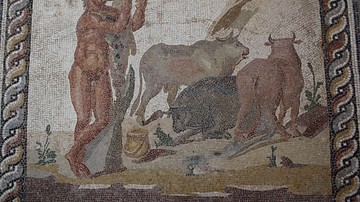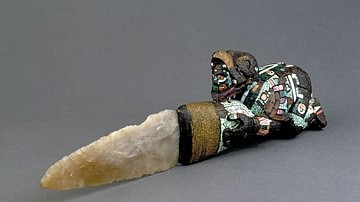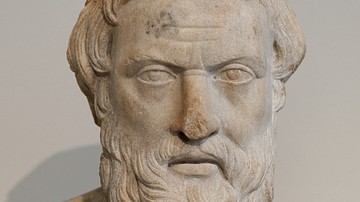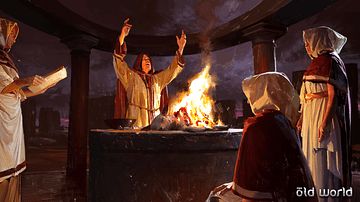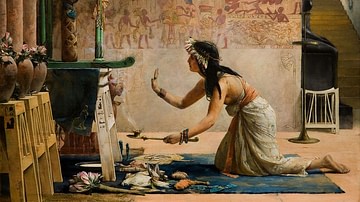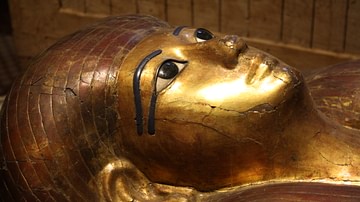II:38. The males of the ox kind they consider to belong to Epaphos, and on account of him they test them in the following manner: If the priest sees one single black hair upon the beast he counts it not clean for sacrifice; and one of the priests who is appointed for the purpose makes investigation of these matters, both when the beast is standing upright and when it is lying on its back, drawing out its tongue moreover, to see if it is clean in respect of the appointed signs, which I shall tell of in another part of the history: he looks also at the hairs of the tail to see if it has them growing in the natural manner: and if it be clean in respect of all these things, he marks it with a piece of papyrus, rolling this round the horns, and then when he has plastered sealing-earth over it he sets upon it the seal of his signet-ring, and after that they take the animal away. But for one who sacrifices a beast not sealed the penalty appointed is death.
II:39. In this way then the beast is tested; and their appointed manner of sacrifice is as follows: they lead the sealed beast to the altar where they happen to be sacrificing and then kindle a fire: after that, having poured libations of wine over the altar so that it runs down upon the victim and having called upon the god, they cut its throat, and having cut its throat they sever the head from the body. The body then of the beast they flay, but upon the head they make many imprecations first, and then they who have a market and Hellenes sojourning among them for trade, these carry it to the market-place and sell it, while they who have no Hellenes among them cast it away into the river: and this is the form of imprecation which they utter upon the heads, praying that if any evil be about to befall either themselves who are offering sacrifice or the land of Egypt in general, it may come rather upon this head. Now as regards the heads of the beasts which are sacrificed and the pouring over them of the wine, all the Egyptians have the same customs equally for all their sacrifices; and by reason of this custom none of the Egyptians eat of the head either of this or of any other kind of animal.
II:40. But the manner of disembowelling the victims and of burning them is appointed among them differently for different sacrifices; I shall speak however of the sacrifices to that goddess whom they regard as the greatest of all, and to whom they celebrate the greatest feast. When they have flayed the bullock and made imprecation, they take out the whole of its lower entrails but leave in the body the upper entrails and the fat; and they sever from it the legs and the end of the loin and the shoulders and the neck: and this done, they fill the rest of the body of the animal with consecrated loaves and honey and raisins and figs and frankincense and myrrh and every other kind of spices, and having filled it with these they offer it, pouring over it great abundance of oil. They make their sacrifice after fasting, and while the offerings are being burnt, they all beat themselves for mourning, and when they have finished beating themselves they set forth as a feast that which they left unburnt of the sacrifice.

II:41. The clean males then of the ox kind, both full-grown animals and calves, are sacrificed by all the Egyptians; the females however they may not sacrifice, but these are sacred to Isis; for the figure of Isis is in the form of a woman with cow's horns, just as the Hellenes present Io in pictures, and all the Egyptians without distinction reverence cows far more than any other kind of cattle; for which reason neither man nor woman of Egyptian race would kiss a man who is a Hellene on the mouth, nor will they use a knife or roasting-spits or a caldron belonging to a Hellene, nor taste of the flesh even of a clean animal if it has been cut with the knife of a Hellene. And the cattle of this kind which die they bury in the following manner: the females they cast into the river, but the males they bury, each people in the suburb of their town, with one of the horns, or sometimes both, protruding to mark the place; and when the bodies have rotted away and the appointed time comes on, then to each city comes a boat from that which is called the island of Prosopitis (this is in the Delta, and the extent of its circuit is nine schoines). In this island of Prosopitis is situated, besides many other cities, that one from which the boats come to take up the bones of the oxen, and the name of the city is Atarbechis, and in it there is set up a holy temple of Aphrodite. From this city many go abroad in various directions, some to one city and others to another, and when they have dug up the bones of the oxen they carry them off, and coming together they bury them in one single place. In the same manner as they bury the oxen they bury also their other cattle when they die; for about them also they have the same law laid down, and these also they abstain from killing.
II:42. Now all who have a temple set up to the Theban Zeus or who are of the district of Thebes, these, I say, all sacrifice goats and abstain from sheep: for not all the Egyptians equally reverence the same gods, except only Isis and Osiris (who they say is Dionysos), these they all reverence alike: but they who have a temple of Mendes or belong to the Mendesian district, these abstain from goats and sacrifice sheep. Now the men of Thebes and those who after their example abstain from sheep, say that this custom was established among them for the cause which follows: Heracles (they say) had an earnest desire to see Zeus, and Zeus did not desire to be seen of him; and at last when Heracles was urgent in entreaty Zeus contrived this device, that is to say, he flayed a ram and held in front of him the head of the ram which he had cut off, and he put on over him the fleece and then showed himself to him. Hence the Egyptians make the image of Zeus into the face of a ram; and the Ammonians do so also after their example, being settlers both from the Egyptians and from the Ethiopians, and using a language which is a medley of both tongues: and in my opinion it is from this god that the Ammonians took the name which they have, for the Egyptians call Zeus Amun. The Thebans then do not sacrifice rams but hold them sacred for this reason; on one day however in the year, on the feast of Zeus, they cut up in the same manner and flay one single ram and cover with its skin the image of Zeus, and then they bring up to it another image of Heracles. This done, all who are in the temple beat themselves in lamentation for the ram, and then they bury it in a sacred tomb.
